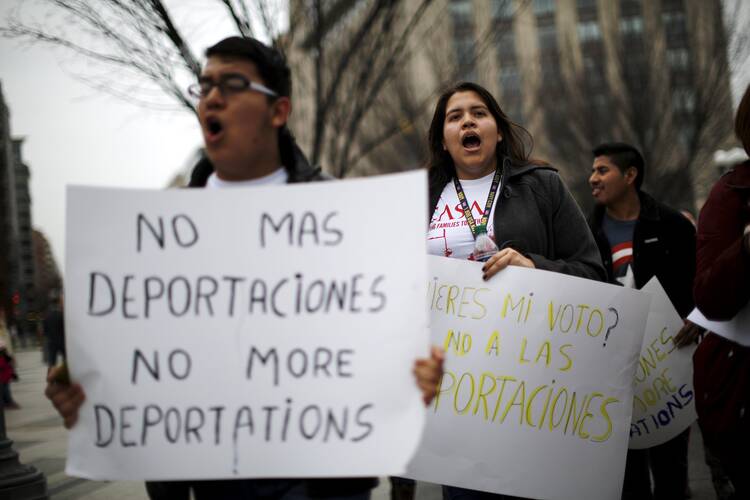Catholic advocacy agencies quickly joined the pushback after Immigration and Customs Enforcement agents at the beginning of the year arrested immigrants, all Central American families, who were in the United States illegally.
After a series of meetings with Homeland Security officials Jan. 11, Senate Minority Leader Harry Reid, D-Nevada, told reporters, "I think you're going to find a pause in these deportations."
But Jeanne Atkinson, executive director of the Catholic Legal Information Network, known as CLINIC, said she was left with the impression the arrests will continue, although likely not in early morning roundups that advocates said spread terror throughout immigrant communities after women and young children were sent to detention centers.
Atkinson said she told Homeland Security, "We would like you, at a minimum, to change how you're going about doing this. We were very strong and I would think, effective, actually, in highlighting just those issues."
Her organization, which offers legal assistance to immigrants, is based in the Washington suburb of Silver Spring, Maryland.
"There's a lot of fear in the community, and so we're trying to make sure that people do have a sense of who is most at risk," Atkinson said in an interview with Catholic News Service. "For example, there's a memo from 2011. (ICE agents) can't go into churches, hospitals or schools to pick up people. So we want to make sure that people understand that they can continue going about their lives. Going to ESL (English as a Second Language) classes, going to church, going to the hospital if they need care."
"This is stuff we haven't seen for a couple of years, this level of anxiety," said David Leopold, a former president of the American Immigration Lawyers Association. "The administration is looking at this humanitarian crisis solely through the lens of immigration enforcement and immigration laws, and (not) the root problem. What's important here is the larger question of America's responsibility to stop this violence in Central America."
ICE officers arrested 121 immigrants Jan. 2 and 3, focusing on Texas, Georgia and North Carolina.
All had crossed the border after May 1, 2014, and had been ordered deported by an immigration judge who ruled they did not qualify for asylum. Many of the deportation orders were in absentia, since the immigrants had either not shown up for their hearing or did not know about it. Of those, 77 from Mexico, Guatemala and Honduras already have been deported.
The arrests were the first large-scale effort to deal with a spike in immigrants entering the country illegally—an estimated 10,000 just in October and November were children—fleeing poverty and violence in Central America during 2014 and 2015, when more than 100,000 people came across the American border.
Atkinson said lawyers from her group were able to meet in Texas with 13 of the families who were rounded up, "and of them, we've gotten stays for 12. We were able to determine that twelve had claims for protection—essentially, asylum."
Auxiliary Bishop Eusebio L. Elizondo of Seattle, chairman of the U.S. bishops' migration committee, and Bishop Kevin W. Vann of Orange, California, board chairman of CLINIC, issued a joint statement protesting the arrests.
"We find such targeting of immigrant women and children—most of whom fled violence and persecution in their home countries—to be inhumane and a grave misuse of limited enforcement resources," they said. "DHS's action contrasts sharply with the statements articulated by President (Barack) Obama himself in November 2014, namely, that his administration would pursue the deportation of 'felons, not families; criminals, not children; gang members, not a mom who's working hard to provide for her kids.'"
"We're of course aware of these concerns," White House spokesman Josh Earnest said Jan. 8. "But the enforcement strategy and priorities that the administration has articulated are not going to change."
"It's crass politics," Leopold told CNS. "From a moral standpoint, it's reprehensible. What they ought to be doing is, they should be giving these people temporary protective status. They don't have to go to Congress. The president can do it with a stroke of a pen."
Leopold said the solution is to create "regional self-havens, in-country refugee processing, places where people can go and be safe, so they don't have to make that journey up here."
Atkinson agreed that election-year politics loom as a factor, since Republican front-runner Donald Trump has announced that he wants to build a massive wall stretching across the border with Mexico and has made immigration restrictions a cornerstone of his campaign.
"All of us have heard this idea that these raids will act as a deterrent on women and children coming from Central America," she said. "It's not surprising given the rhetoric we have heard in the campaign, so far, that there would be a political implication there."
However, she continued, "I don't think there is a deterrent factor. It's kind of hard to imagine that when a mother is considering that her son could be killed by gangs or that her daughter might be raped, or she may disappear, that she's thinking whether she might get picked up in a raid once she's here and (that) that's going to stop her from protecting her family."








